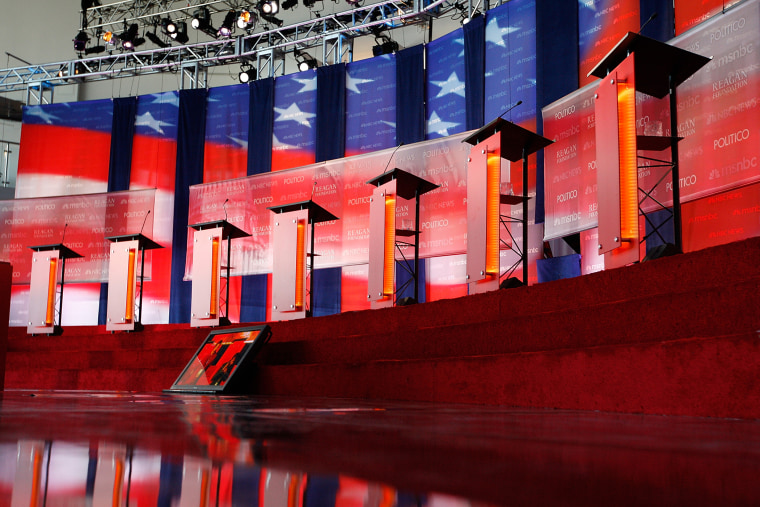All three senators indicated that they would reject a deal that would cut $10 in spending for every $1 in new taxes, though none of them directly answered the question.... "When and if any of the people up here run for president, there should be an absolute rule: No yes or no answers," Paul said. He then indicated that he wouldn't like such a deal. "I think we have plenty of taxes in this country." Cruz said that while it's a question "the media likes to ask," it represents a false choice. "That trade-off has proven historically to be a fool's errand," Cruz said. "It's a little bit like Lucy and the football. One element of the promise never happens." Rubio chimed in: "The only way you can get out of this problem is spending discipline, holding the line on spending, and rapid and dynamic economic growth."
What we're learning about the GOP's 2016 field
The unofficial kickoff of the 2016 presidential race made clear just how far to the right the GOP candidates intend to be.

A debate for the Republican presidential candidates in August 2011 featured one of the more memorable moments of the race. Eight GOP hopefuls shared the stage and were asked an interesting question: would they accept a debt-reduction deal in which Democrats would give up $10 in spending cuts for every $1 in tax increases? Every Republican on the stage said they'd reject the deal.
Jon Huntsman later conceded he regretted how he handled that moment and wished he'd answered differently, but what about his party? As the 2016 cycle slowly starts to get underway, the question still seems relevant, and at a Koch brothers' donor forum last night, ABC's Jonathan Karl put the same challenge to Sens. Ted Cruz (R-Texas), Rand Paul (R-Ky.) and Marco Rubio (R-Fla.).
A lot of people forget this, but in March 2011, following the big Tea Party wave of 2010, Republicans on the Joint Economic Committee released a report on deficit reduction. In it, House GOP officials outlined their ideal cuts-to-revenue ratio, and concluded that "successful" attempts to cut the deficit meet a specific goal: "85% spending cuts and 15% revenue increases." Roughly speaking, that's about a 5-to-1 ratio in Republicans' favor.
Four years later, however, leading Republican presidential candidates are apparently well to the right of where House GOP officials were in 2011. The fact remains that a Democratic 10-to-1 offer would never happen -- there's nothing fair or just about a "compromise" tilted so heavily in the GOP's favor -- but the point is most leading Republicans wouldn't accept the gift anyway.
Why does this matter? Because this weekend was arguably the unofficial kickoff of the 2016 presidential race, and as the process gets underway, it's already clear just how far to the right the GOP candidates intend to be.
There were plenty of opportunities to see the party's likely candidates prove the point. Over the course of roughly 36 hours, about a dozen possible presidential hopefuls appeared at the Iowa Freedom Summit, the Koch brothers' donor event, "The Response" prayer rally in Louisiana, or some combination thereof. What'd we learn?
Wisconsin Gov. Scott Walker (R) benefited from low expectations and won praise from Iowa conservatives; New Jersey Gov. Chris Christie (R) still thinks it's funny to tell jokes about Al Gore inventing the Internet; and Donald Trump desperately wants attention.
Former Gov. Mitt Romney (R) will announce his intentions within two weeks; former Gov. Jeb Bush (R) skipped all of the events and is striking a moderate tone; Louisiana Gov. Bobby Jindal (R) couldn't fill his arena; former Gov. Rick Perry (R) is probably a better candidate than he was four years ago; and right-wing activists really do like Ben Carson (R).
It's going to be quite a year.